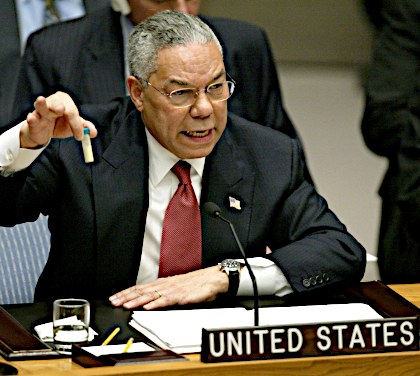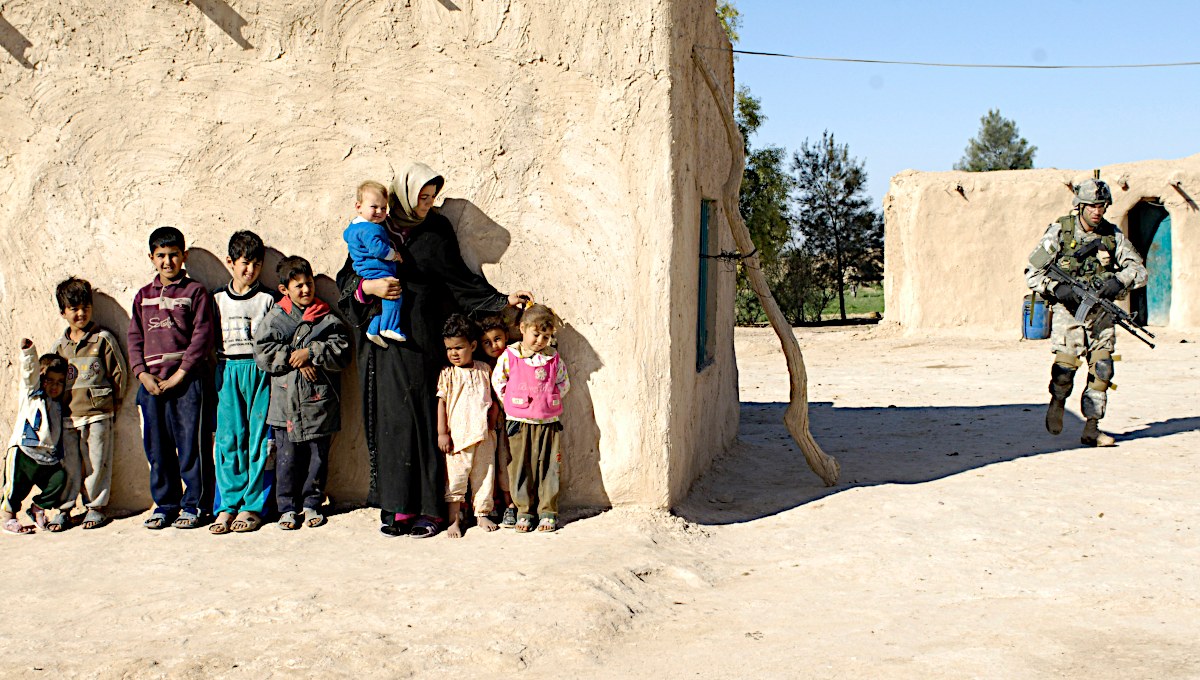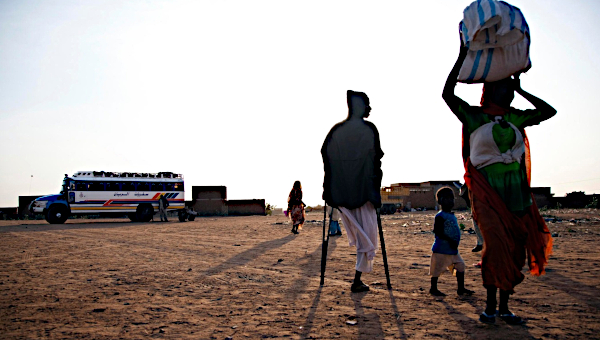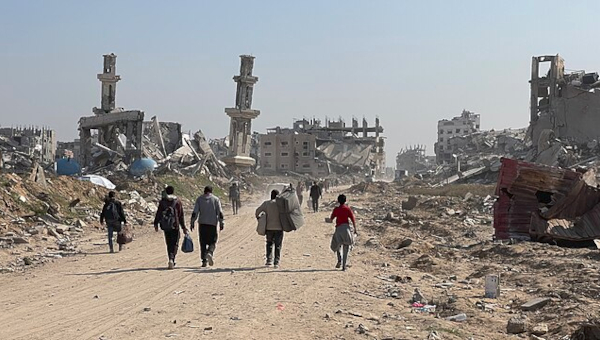The Iraq War Changed Our World for the Worse
Twenty years ago today, the US government and a “Coalition of the Willing” invaded the sovereign country of Iraq.
According to Richard A. Clarke, former US chief counter-terrorism adviser, US President George W. Bush approached him on the day after the 11 September 2001 terrorist attacks, asking him to establish a connection between the attacks and the Iraqi regime. Clarke told Bush that Iraq had nothing to do with it. In his 2004 book Against all Enemies: Inside America’s War on Terror, Clarke wrote that Bush and US Secretary of Defense Donald Rumsfeld had wanted to come up with a pretext to bomb Iraq. For the moment, however, these plans fell through.

Soon after the beginning of the US- and NATO-led war in Afghanistan, the US government came up with a new lie to justify invading Iraq. Together with the British government under Tony Blair, they argued that Iraq possessed weapons of mass destruction that could reach NATO outposts in the Eastern Mediterranean Sea within 45 minutes. US Secretary of State Colin Powell repeated the lie in front of the United Nations.
Putin Follows Bush’s Example
Last year, when the Russian government and Vladimir Putin tried to justify their war in Ukraine by citing the UN Charter’s Article 51 on self-defence and arguing that there was a secret nuclear weapons programme in Ukraine capable of reaching Saint Petersburg and Moscow within five minutes, they were ultimately drawing on the same kind of ideological arsenal and cheap war lies. Just as much as the Bush administration never sought to prove there were WMDs (weapons of mass destruction) in Iraq – Bush later was quoted as saying that he was just not that interested in finding them – nor did the Russian government even try to provide “evidence” for its claims.
Yet, in 2002–03, several key NATO allies, including, most notably, France and Germany, refused to follow the US foreign policy agenda, which is why the US set up the “Coalition of the Willing” that included countries like the UK, Poland, Hungary, Lithuania, Latvia, the Czech Republic, and Slovakia, but also Spain, Italy, and the Netherlands. The US Right was so furious that they launched a successful campaign to rebrand “French fries” as “freedom fries” for a while, just like the US entry into World War I in 1917 resulted in a re-branding of “Frankfurters” into “hot dogs.”
Meanwhile, in Germany, conservatives saw the German government’s opposition to the impending Iraq War as a diplomatic disaster. Angela Merkel, the conservative opposition leader at the time who two years later would become Federal Chancellor for the next 16 years, flew to the US to apologize for Chancellor Gerhard Schröder’s decision, writing an op-ed in the Washington Post under the title “Gerhard Schroeder Does Not Speak for All Germans.” That, however, was untrue, as Schröder’s course actually helped him win re-election against all odds. Together with a major flood in eastern Germany, it helped to boost his standing among the eastern electorate and kick the post-Communist Party of Democratic Socialism (PDS) out of Parliament for the next three years. The PDS said that it would help re-elect Schröder as Chancellor, so people just voted directly for Schröder and reduced the PDS to less than the required 5% threshold.
In any case, the rift in the trans-Atlantic relationship helped a critical public sphere drag the US war lies deep into the mainstream and onto primetime TV. The resonance would be felt for a long time. Global polls conducted by the Pew Research Group detected a deep-seated mistrust of US foreign policy afterwards. As a result, when the German public refused to follow the official trans-Atlanticist policy line on Ukraine in 2013–2014, it led German foreign policy analyst Michael Thumann of the reliably trans-Atlanticist weekly, DIE ZEIT to ask whether they, i.e., the liberal and conservative mainstream press, had reported too critically about the war and US war crimes, not to mention US surveillance of the German political establishment.
This criticism of the US and UK war effort found a broad audience beyond the oppositional left-wing press in Western Europe and helped to bring about the biggest anti-war movement since the US war in Vietnam. On 15 February 2003, millions of people took to the streets to prevent the impending war on Iraq – 3 million in Rome, 1.5. million in Madrid. It is estimated that the 3,000 anti-war protests worldwide were attended by around 36 million people that day.

Bloody War
But the war in Iraq could not be stopped. Bush said that the American troops would be “greeted as liberators.” The result, however, was a bloody war of occupation.
The sectarian remaking of the Iraqi body politic, which excluded the older political establishment largely recruited from the Sunni minority from administrative positions, helped to feed a bloody civil war. The war effort led to between 28,800 and 37,400 dead soldiers and an unknown number of wounded and maimed on the Iraqi side and close to 5,000 dead and more than 33,000 wounded American soldiers. The Iraq Body Count recorded 103,160 to 113,728 civilian deaths from 2003 until 14 December 2011. Statistical estimates are much higher: Lancet estimates 654,965 civilian deaths from March 2003 until July 2006 alone. Opinion Research Business estimates 1.033 million deaths from March 2003 until August 2007, and the PLOS Medicine Study claims a body count of 405,000 from March 2003 until June 2011.
The war on Iraq was just one geographical space of the US “war on terror,” which critics deemed a war of terror. The US government still conducts “counter-terrorist operations” in 85 countries around the world. The Costs of War research project located at Brown University has analysed those humanitarian and financial costs since 2010. Researchers estimate that “over 929,000 people have died in the post 9-11 wars due to direct war violence,” including over 387,000 civilians. Additionally, “several times as many” are said to have died “due to the reverberating effects of war.” Thirty-eight million people were displaced. To put all this into perspective, casualties in the first year of the war in Ukraine are estimated to be almost 300,000 dead soldiers. The United Nations estimated the number of dead civilians to be 8,231 as of 12 March 2023.
The Costs of War research project estimates the financial costs of the post-9/11 “war on terror” – these numbers exclude current US military aid to Ukraine – to be $8-trillion. That is more than ten times the amount of the American Recovery and Reinvestment Act, the Obama administration’s giant stimulus program to combat the global financial crisis in 2008–2009. It also dwarfs President Joe Biden’s initial spending plans to rejuvenate the economy.
The war on Iraq replaced Saddam Hussein. At the same time, it created a horrific environment of insecurity and violence, it largely destroyed the infrastructure of the country, and it led to disastrous levels of unemployment (peaking at an unofficial 60 percent after the invasion) and a humanitarian crisis. Even today, according to Gallup polls conducted to mark the twentieth anniversary of the US invasion, four in ten Iraqis struggle to afford food, and unemployment is still high, giving birth to frequent mass protests such as the ones in 2019. According to Gallup, “[a majority] of Iraqis in 2022 reported experiencing pain (61%), worry (59%), and stress (53%) during much of the previous day, and nearly half experienced anger (46%) and sadness (45%).”
Many remember Muntadhar al-Zaidi, the Iraqi journalist who threw his shoe at George W. Bush in protest against the invasion, an act commemorated in Iraq today by a two-meter-high statue of a giant shoe. But the invasion also left behind tens of thousands of traumatized American and British soldiers. One of them is Michael Prysner, who interrupted a speech given by George W. Bush in Beverly Hills, California, on 19 September 2021 and demanded that the former president apologize for his administration’s lies about weapons of mass destruction and the deaths of a million Iraqis. “You sent me to Iraq,” he said. “My friends are dead because you lied.”
Wars and Unforeseen Consequences
The Iraq War must be remembered for what it led to in world-historical terms. It was in Iraq’s prisons run by the occupying forces that people from the former security apparatuses (of a hitherto secular state) joined forces with other prisoners from al-Qaida in Iraq. Together they formed ISIL (later ISIS or the “Islamic State”) and utilized the vacuum emerging from the war in Syria, which resulted from the Assad government’s brutal repression of the Arab Spring in Syria and became a proxy war with various global and regional powers.
In other words, without the US and UK war on Iraq, ISIS would never have emerged. Without the Iraq War, the West would not have seen years of Islamic fundamentalist and Salafist terrorist attacks seeking to force “Western” powers out of the Middle East, just as the terrorist attacks on the subway in Madrid failed to lead the Spanish government to withdraw from the Coalition of the Willing.
Furthermore, without ISIS and the attempt to establish a new “Caliphate,” ISIS sympathizers around the world would not have conducted asymmetrical warfare against the civilian populations of the countries involved in the proxy war in Syria. Without such attacks, and without the mass exodus of millions of displaced people from Syria, Iraq, and Afghanistan, the rise of right-wing authoritarian nationalism and anti-Muslim racist forces in Europe as well as North America would not have been as easy as it has been. In other words, the war on Iraq changed the world tremendously – for the worse.
Yet unlike Vladimir Putin, those who lied to the UN and the global public and ordered and conducted a war that killed hundreds of thousands of civilians are still at large. They are not sought by arrest warrants issued in The Hague. As a matter of fact, they are welcomed as elder statesmen in both the US and Europe. Even if an International Criminal Court arrest warrant were to be issued against American war criminals, the US has time and time again threatened to invade the Netherlands to prevent their prosecution. •
This article first published on the Rosa Luxemburg Stiftung website.





